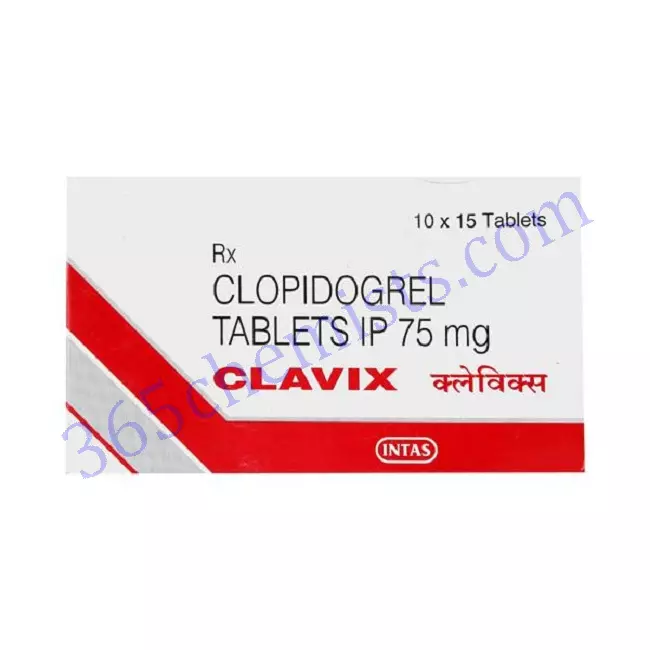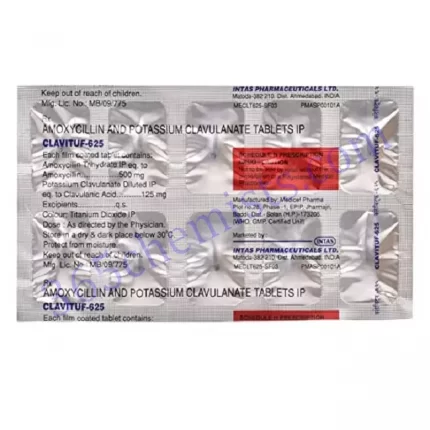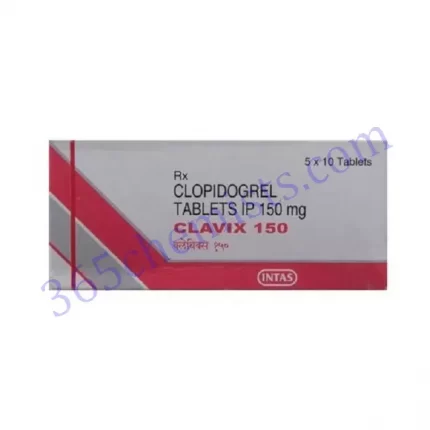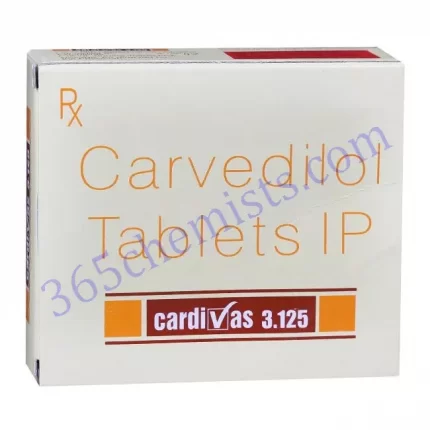Clavix Tablet: A Key Medication for Antiplatelet Therapy
Clavix Tablet contains 75 mg of clopidogrel, which is a common antiplatelet medicine used for the prevention of blood clots in persons who are at risk of having cardiovascular events. It is a member of the group of medications known as thienopyridines and works by preventing the aggregation of platelets, so lessening the likelihood of blood clots forming and ensuring that adequate blood flow is maintained.
Mechanism of Action
The active component of Clavix Tablet, clopidogrel, exerts its effects in a two-step procedure, which are as follows:
- Activation occurs when enzymes in the liver transform inactive clopidogrel into its active form following oral ingestion of the drug. This active form binds to the P2Y12 adenosine diphosphate (ADP) receptor on platelets in an irreversible manner, which inhibits the activation of the platelets and prevents the amplification of the platelet aggregation process.
- Platelet Aggregation Inhibition Clopidogrel works by inhibiting the P2Y12 receptor, which in turn inhibits the response of platelets to ADP. This results in a reduction in platelet aggregation, which in turn reduces the formation of blood clots. This technique aids in keeping blood vessels open and wards against any difficulties associated with the formation of clots.
Clinical Indications
The following conditions are typically treated with a prescription for Clavix Tablet:
- Clopidogrel is frequently prescribed to patients who have been diagnosed with acute coronary syndrome. This condition encompasses a variety of heart conditions, including unstable angina and myocardial infarction, amongst others. It helps to stop the production of new clots, lowers the risk of future cardiovascular events, and improves overall results.
- Individuals undergoing treatments such as coronary stenting or angioplasty are required to take antiplatelet medication with Clopidogrel in order to avoid stent thrombosis and maintain optimal blood flow through the treated artery. This is done as part of percutaneous coronary intervention.
Related Product
Clavix 150 Tablet
Clavix 75mg Tablet
Clavix Gold 10 Capsule
Clavix Gold 20 Capsule
Clavix AS 75 Tablet
Clavix AS 150 Tablet
Dosage and Administration
A healthcare expert should evaluate an individual’s specific condition as well as their medical history in order to establish the appropriate dosage of Clavix Tablet that should be taken. It is essential to ensure that the dosage and administration instructions provided by the healthcare professional are strictly adhered to at all times. Clavix Tablet is intended to be swallowed, and can be taken either with or without meals. In order to achieve the best possible outcomes from treatment, it is essential to take the drug at the exact same time every day.
Safety Profile and Possible Side Effects
The safety profile of Clavix Tablet has been thoroughly investigated. On the other hand, just like any other medication, it has the potential to induce adverse effects in certain people. Symptoms related to the digestive tract, such as nausea, diarrhoea, or abdominal pain, are among the most often experienced adverse effects. People might also bleed, bruise easily, or have allergic responses, but these side effects are much less common. It is essential to speak with a qualified medical practitioner in the event that any unsettling side effects manifest themselves.
Precautions and Considerations
Before beginning treatment with Clavix Tablet, it is essential to discuss any pre-existing medical issues, allergies, or medications that you are presently taking with your healthcare professional. Clopidogrel may cause potential difficulties if it is taken in conjunction with a disease or drug that causes an interaction. It is of the utmost importance to be completely forthcoming with the healthcare practitioner regarding any past history of bleeding issues, recent operations, or upcoming treatments.
Benefits and Efficacy of Clavix Tablet
The Clavix Tablet, which is made up of 75 mg of clopidogrel, provides a number of benefits and has been shown to be effective in a variety of therapeutic scenarios. It is a very important factor in preventing the formation of blood clots and lowering the risk of cardiovascular events. The following are some significant elements that emphasise the benefits of using Clavix Tablet and its effectiveness:
- Clopidogrel has been the subject of a great deal of research, and its efficacy in preventing cardiovascular events like heart attacks and strokes in those who are at a high risk for developing these conditions has been demonstrated. It does this by limiting the aggregation of platelets, which in turn helps to keep the blood flowing and stops the formation of potentially dangerous blood clots.
- Clavix Tablet is often used in patients who have undergone percutaneous coronary intervention (PCI) procedures, such as the implantation of stents. This medication has been shown to reduce the risk of stent thrombosis. It helps avoid a condition known as stent thrombosis, which is the production of blood clots that can cause the treated artery to become blocked, which can result in serious problems.
- Management of Acute Coronary Syndrome Clopidogrel is an essential component of the therapy protocol for patients diagnosed with acute coronary syndrome (ACS), which can include unstable angina and myocardial infarction. Stabilising the condition, lowering the risk of further cardiovascular events, and improving overall outcomes are all benefits of this treatment.
- Dual Antiplatelet Therapy: Aspirin and the Clavix Tablet are a common combination that doctors will recommend for patients undergoing dual antiplatelet therapy. It has been demonstrated that the use of this combination medication produces synergistic effects in both the prevention of cardiovascular events and the reduction of the risk of stent thrombosis in patients who are undergoing PCI.
- Clavix Tablet has a well-established safety profile when used in accordance with the instructions provided by healthcare professionals when it is taken as prescribed. In most cases, adverse effects are not severe and may be treated. In the majority of people who are at a high risk of cardiovascular events, the advantages of the medicine outweigh the possible hazards of taking it.
Conclusion
Clavix Tablet, which contains Clopidogrel 75mg, is an important medication for the reduction of the risks associated with cardiovascular disease as well as the prevention of blood clots. It does this by preventing platelets from aggregating and keeping blood flow at an adequate level, both of which contribute to the prevention of issues related with clot formation. It is absolutely necessary to take the medication exactly as directed by a medical practitioner and to strictly adhere to the dosage that has been recommended in order to accomplish the therapeutic goals that have been set. Clavix Tablet, when used in conjunction with other lifestyle changes and with frequent medical follow-up, can help to contribute to the maintenance of healthy cardiovascular function and to reduce the risk of problems. Maintaining a healthy cardiovascular system over the long run requires consistent engagement with medical professionals and a commitment to following their recommendations.












